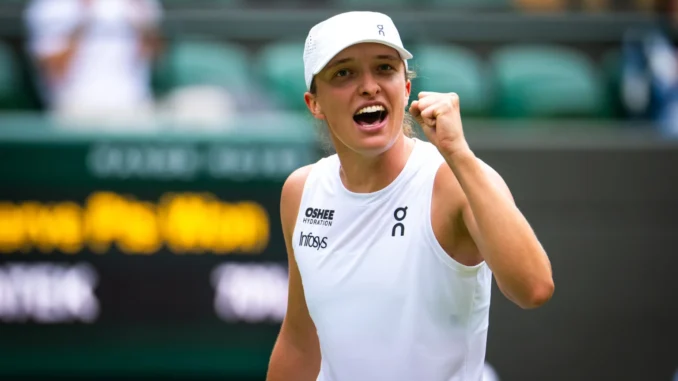
On a sun-drenched afternoon at the All England Club, Iga Swiatek delivered a masterclass in dominance, crushing Amanda Anisimova 6-0, 6-0 in the 2025 Wimbledon women’s final to claim her first title on the grass courts and her sixth Grand Slam overall. The 57-minute demolition, the first double-bagel Wimbledon final in 114 years, left the tennis world in awe and sparked a poignant question: Did Swiatek ever consider easing up to give her opponent a game? The 24-year-old Pole’s response was as unflinching as her performance. “Honestly, I didn’t even think about it,” Swiatek said, her words reflecting the laser-focused mindset that propelled her to victory. “My goal was to play my best tennis, to stay in the zone, and that’s what I did.” Her remarks underscored a champion’s mentality, one that prioritizes excellence over sentiment, even in the face of a one-sided thrashing.
The final, played on July 12, 2025, was a historic moment for Swiatek, who became the first Polish singles champion at Wimbledon and the eighth consecutive first-time women’s winner at the tournament. For years, grass had been her kryptonite, with the low bounce and slick surface challenging her topspin-heavy game. Her best prior result at Wimbledon was a quarterfinal in 2023, and she admitted, “I didn’t even dream of winning Wimbledon because it was way too far.” Yet, under the guidance of new coach Wim Fissette, Swiatek transformed her grass-court game, arriving in London with renewed confidence after a runner-up finish at a tune-up event in Germany. Her preparation paid off as she dropped just one set en route to the final, dispatching opponents with ruthless efficiency, including a 6-2, 6-0 semifinal win over Belinda Bencic.
Against Anisimova, Swiatek was untouchable. She broke the American’s serve in the opening game, setting the tone for a match where Anisimova won just 24 of 79 points and committed 28 unforced errors, including five double faults. Swiatek’s precision was staggering: she landed 78% of her first serves, committed only 11 errors, and never faced a break point. “I think I moved better, served better, returned better,” she reflected, noting her improvement on grass. The crowd, sensing Anisimova’s nerves, rallied behind the underdog, but Swiatek’s relentless returning and defensive prowess left no room for a comeback. The result echoed Steffi Graf’s 6-0, 6-0 rout of Natalia Zvereva at the 1988 French Open, marking only the second such scoreline in an Open Era Grand Slam final.
For Anisimova, the final was a painful milestone. The 23-year-old American, in her first Grand Slam final, had dazzled Wimbledon by upsetting world No. 1 Aryna Sabalenka in the semifinals. Her journey was a testament to resilience, having taken an eight-month mental health break in 2023 after burnout and the loss of her father and coach, Konstantin, in 2019. “It’s been an incredible fortnight for me, even though I ran out of gas a bit today,” Anisimova said, addressing the Centre Court crowd with grace despite her tears. She admitted to being overwhelmed, stating, “I was a bit frozen there with my nerves. Maybe the last two weeks I got a bit tired or something.” Her 41 double faults across the tournament, the highest in the women’s draw, underscored her struggles, particularly on serve, where she won just 26% of first-serve points against Swiatek.
Swiatek’s refusal to ease up was not born of cruelty but of respect for the game. “You’re such an incredible player. It obviously showed today,” Anisimova told her at the net, acknowledging Swiatek’s brilliance. The Pole, in turn, offered words of encouragement, saying, “No matter what happened today, you should be proud of the work you’re doing.” Swiatek’s performance was a statement of her evolution, proving she could dominate on all surfaces—clay, hard, and now grass. Her 100th career Grand Slam match win, achieved in just 120 matches, placed her alongside legends like Serena Williams in terms of efficiency. “I just wanted to enjoy the time that I had on Centre Court,” Swiatek said, savoring the moment as she received the Venus Rosewater Dish from Kate, the Princess of Wales.
Anisimova’s defeat, though crushing, was a stepping stone. Her run to the final, which included a 6-0, 6-0 win over Yulia Putintseva in the first round, propelled her to a career-high ranking of No. 7. “I’ll keep believing in myself, and I hope to be back here one day,” she vowed, determined to learn from the experience. For Swiatek, the victory capped a remarkable turnaround after a challenging year, including a one-month doping ban in 2024 due to a contaminated sleeping pill. With Fissette’s guidance, she rediscovered her form, proving that even undreamt dreams can come true on the hallowed grass of Wimbledon.
Leave a Reply